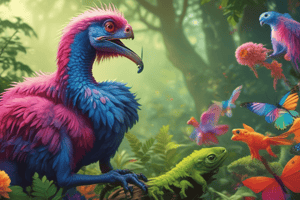Podcast
Questions and Answers
What is the fundamental concept in biology that involves the gradual process of living organisms changing over time?
What is the fundamental concept in biology that involves the gradual process of living organisms changing over time?
- Adaptation
- Evolution (correct)
- Genetics
- Natural Selection
Which mechanism of evolution refers to the inherent ability of species to adjust and acclimate to their environments?
Which mechanism of evolution refers to the inherent ability of species to adjust and acclimate to their environments?
- Natural Selection
- Mutation
- Adaptation (correct)
- Genetics
In adaptation, beneficial traits that enhance survival and reproduction success tend to ____ when conditions favor them.
In adaptation, beneficial traits that enhance survival and reproduction success tend to ____ when conditions favor them.
- Degrade
- Thrive (correct)
- Disappear
- Stagnate
Which mechanism of evolution describes how certain genetic variations in populations lead to adaptations?
Which mechanism of evolution describes how certain genetic variations in populations lead to adaptations?
What type of traits increase in frequency across generations due to natural selection?
What type of traits increase in frequency across generations due to natural selection?
Which evolutionary mechanism involves individuals with specific traits having higher chances of surviving and producing offspring relative to others?
Which evolutionary mechanism involves individuals with specific traits having higher chances of surviving and producing offspring relative to others?
What process drives evolution according to the text?
What process drives evolution according to the text?
How do genetic variations contribute to adaptation?
How do genetic variations contribute to adaptation?
What are alleles?
What are alleles?
How do allele combinations impact organisms?
How do allele combinations impact organisms?
Which component continually shapes our world according to the text?
Which component continually shapes our world according to the text?
What drives diversification and complexity among lifeforms according to the text?
What drives diversification and complexity among lifeforms according to the text?
Flashcards are hidden until you start studying
Study Notes
Understanding Evolution through Adaptation, Natural Selection, and Genetics
Evolution is a fundamental concept in biology—the gradual process by which living organisms change over time. This transformation stems from three interconnected mechanisms: adaptation, natural selection, and genetics. As we explore these facets of evolution, let's delve into their individual roles in shaping life on Earth.
Adaptation
Adaptation refers to the inherent ability of species to adjust and acclimate to their environments. Organisms with beneficial traits, those enhancing survival and reproduction success, tend to thrive when conditions favor them. These advantageous characteristics become more common within populations due to factors such as improved food availability, predator avoidance, or reproductive successes. For instance, consider polar bears: Their thick fur insulates them against harsh cold, enabling them to survive and reproduce better in arctic regions compared to other bear species. Over generations, this trait has led to a population predominantly adapted to extreme low temperatures.
Natural Selection
Natural selection describes how certain genetic variations in populations lead to adaptations. When individuals possessing specific traits have higher chances of surviving and producing offspring relative to others lacking them, these desirable traits increase in frequency across subsequent generations. In essence, the environment 'selects' which traits persist or perish—a process that drives evolution. Charles Darwin outlined this mechanism in his seminal work On the Origin of Species, where he observed organismic changes occurring throughout history.
Genetics
Genetic variation underpins natural selection and provides the raw material essential for adaptation. Every creature carries two sets of genes inherited from its parents. A gene can come in different forms called alleles; genomically distinct versions of the same gene. Such variants arise spontaneously during cellular division processes or via mutations introduced from external factors like radiation or chemical agents. Some allele combinations confer advantages, while others do not. If there is heritable variation, some individuals will inherit genes promoting survival and reproduction, leading to an adaptive response according to natural selection principles.
These three components—adaptation, natural selection, and genetics—work together continually to shape our world as we know it today. Each generation builds upon previous ones, resulting in diversification and complexity among lifeforms. By understanding them, you gain insights into the profound forces driving biological transformations both presently and historically.
Studying That Suits You
Use AI to generate personalized quizzes and flashcards to suit your learning preferences.




